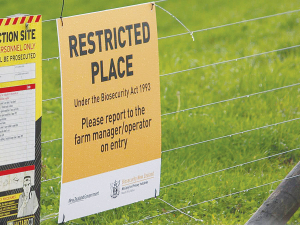We must keep our foot on the pedal
OPINION: Last week marked a major step forward in our work to eradicate Mycoplasma bovis.
 OSPRI has taken over day-to-day operational and disease control functions of the M. bovis programme.
OSPRI has taken over day-to-day operational and disease control functions of the M. bovis programme.
From this month OSPRI took over day-to-day operational and disease control functions of the Mycoplasma bovis (M. bovis) programme.
This means OSPRI will now be responsible for testing farms, the two background surveillance programmes, managing the current active confirmed property and any newly detected farms, depopulation of infected farms, or trace animals and supporting affected farmers.
Programme partners, Ministry for Primary Industries (MPI), Beef + Lamb New Zealand and DairyNZ, will continue to govern and monitor the programme's progress. MPI will retain non-operational aspects of the programme, including compensation, and any necessary compliance action.
OSPRI says the change does not affect farmers and M. bovis levies will not change.
The programme is now more than halfway into an estimated 10-year plan to eradicate M. bovis. The number of infected properties has fallen to very low levels and the major activity of the programme in coming years will be national surveillance of New Zealand's cattle herd. Moving operations from MPI to OSPRI at this stage of the eradication effort is said to provide the best value for the programme funders and farmers.
OSPRI says its proven regional management model reflects its experience in surveillance and disease control.
“The natural synergies between the M. bovis programme and our NAIT and the TBFree programmes will help us achieve operational efficiencies.
“A significant portion of our M. bovis team is coming over from MPI, bringing invaluable programme knowledge to our organisation.”
The M. bovis programme is being administered under a Government Industry Agreement (GIA) between the three partners.
A proposal is under way to change the administration model to a National Pest Management Plan (NPMP) — the same model used for bovine tuberculosis (TB). The proposal nominates OSPRI as the lead agency to deliver the programme for the remainder of the eradication plan.
Public submissions on the draft proposal closed in October 2023. The final proposal is expected to be submitted to the Government for review in 2024.
Tickets are now available for Beef + Lamb New Zealand’s (B+LNZ) Out the Gate, returning from 19-21 May 2026 at Te Pae, Christchurch.
Dairy Women's Network (DWN) is welcoming AgriHealth as a new partner.
Northland Field Days patron Ross Newlove remembers the inaugural field days he attended 40 years ago.
Southland farmer Murray Donald has been appointed as chair of Safer Farms, the industry-led organisation focused on reducing harm, injuries and fatalities in the agricultural sector.
National Lamb Day returns this Sunday, 15 February, with Beef + Lamb New Zealand Inc calling on Kiwis to fire up their barbecues and celebrate the people and the product that put New Zealand on the world map.
When it comes to arranging the sound system at Northland Field Days, no one does it better than Colin Finlayson.
OPINION: Fonterra may be on the verge of selling its consumer business in New Zealand, but the co-operative is not…
OPINION: What does the birth rate in China have to do with stock trading? Just ask a2 Milk Company.